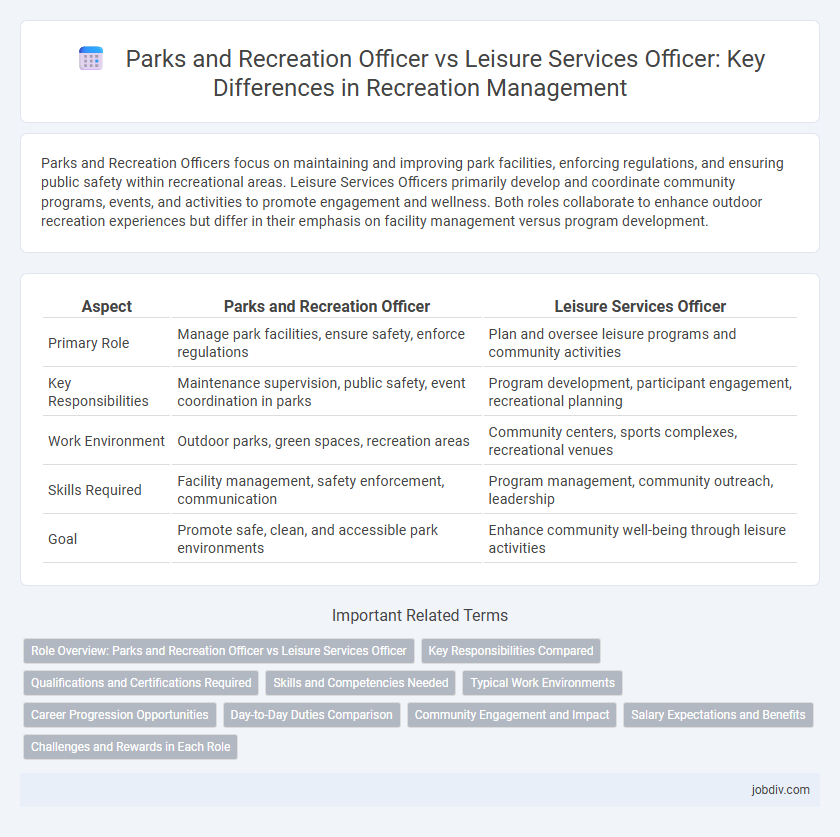Parks and Recreation Officers focus on maintaining and improving park facilities, enforcing regulations, and ensuring public safety within recreational areas. Leisure Services Officers primarily develop and coordinate community programs, events, and activities to promote engagement and wellness. Both roles collaborate to enhance outdoor recreation experiences but differ in their emphasis on facility management versus program development.
Table of Comparison
| Aspect | Parks and Recreation Officer | Leisure Services Officer |
|---|---|---|
| Primary Role | Manage park facilities, ensure safety, enforce regulations | Plan and oversee leisure programs and community activities |
| Key Responsibilities | Maintenance supervision, public safety, event coordination in parks | Program development, participant engagement, recreational planning |
| Work Environment | Outdoor parks, green spaces, recreation areas | Community centers, sports complexes, recreational venues |
| Skills Required | Facility management, safety enforcement, communication | Program management, community outreach, leadership |
| Goal | Promote safe, clean, and accessible park environments | Enhance community well-being through leisure activities |
Role Overview: Parks and Recreation Officer vs Leisure Services Officer
Parks and Recreation Officers manage and maintain public parks, ensuring safety, cleanliness, and the preservation of natural resources while coordinating community events and educational programs. Leisure Services Officers focus on planning, organizing, and supervising recreational activities and programs designed to promote physical health, social interaction, and community engagement. Both roles contribute to enhancing public well-being but differ in emphasis, with Parks and Recreation Officers concentrating on facility upkeep and environmental stewardship, and Leisure Services Officers prioritizing program development and participant involvement.
Key Responsibilities Compared
Parks and Recreation Officers primarily oversee the maintenance and safety of public parks, ensuring facilities are clean, secure, and accessible while coordinating community events and environmental conservation programs. Leisure Services Officers focus on developing, managing, and promoting recreational activities and programs such as sports leagues, arts classes, and wellness initiatives to enhance community engagement. Both roles collaborate on supporting public well-being, but Parks and Recreation Officers emphasize facility management and safety, whereas Leisure Services Officers prioritize program development and participant experience.
Qualifications and Certifications Required
Parks and Recreation Officers typically require certification in park management or environmental science, alongside a background in public safety or law enforcement to effectively oversee park facilities and ensure visitor safety. Leisure Services Officers often hold qualifications in recreation management, community development, or therapeutic recreation, with certifications like Certified Park and Recreation Professional (CPRP) enhancing their ability to design and implement community programs. Both roles benefit from CPR and first aid certifications, but Leisure Services Officers frequently pursue specialized training in program planning and inclusive recreation services to support diverse populations.
Skills and Competencies Needed
Parks and Recreation Officers require expertise in environmental management, facility maintenance, and compliance with safety regulations. Leisure Services Officers emphasize strong program planning, community engagement, and event coordination skills to enhance public participation. Both roles demand excellent communication, leadership, and problem-solving abilities to effectively support recreation initiatives.
Typical Work Environments
Parks and Recreation Officers primarily work in municipal parks, nature reserves, and community centers, overseeing facilities and coordinating outdoor activities. Leisure Services Officers are often employed in recreational departments, sports complexes, or wellness centers, focusing on program development and facility management. Both roles operate within public sector environments but differ in their direct engagement with natural settings versus structured leisure facilities.
Career Progression Opportunities
Parks and Recreation Officers typically advance by gaining expertise in park management, environmental conservation, and public safety enforcement, often progressing to senior supervisory or regional management roles. Leisure Services Officers focus on program development, community engagement, and event coordination, with career growth leading to positions in recreation administration or director roles overseeing multiple service areas. Both career paths offer opportunities for specialization, leadership in public sector roles, and potential transition into broader municipal management positions.
Day-to-Day Duties Comparison
Parks and Recreation Officers primarily manage the maintenance and safety of park facilities, ensuring public spaces are clean and secure while coordinating outdoor event logistics. Leisure Services Officers focus on planning and organizing community programs such as sports leagues, fitness classes, and cultural activities to promote active lifestyles. Both roles require collaboration with local government and community groups, but Parks Officers emphasize facility oversight, whereas Leisure Officers specialize in program development and participant engagement.
Community Engagement and Impact
Parks and Recreation Officers specialize in managing public spaces to enhance community interaction by organizing events and maintaining recreational facilities that promote outdoor activities and environmental stewardship. Leisure Services Officers focus on developing diverse programs that cater to all age groups, fostering social inclusion and improving overall community wellness through leisure and cultural initiatives. Both roles play a critical part in community engagement, with Parks and Recreation Officers emphasizing space utilization and Leisure Services Officers driving programmatic impact.
Salary Expectations and Benefits
Parks and Recreation Officers typically earn an average salary ranging from $40,000 to $60,000 annually, often supplemented by benefits like health insurance, retirement plans, and paid time off reflecting public sector standards. Leisure Services Officers generally command a similar salary range but may receive additional perks such as flexible work hours, community engagement incentives, and professional development opportunities tailored to recreational programming. Both roles offer competitive compensation packages, though variations depend largely on municipal budgets and organizational size within the recreation sector.
Challenges and Rewards in Each Role
Parks and Recreation Officers face challenges such as managing public safety, maintaining facilities, and coordinating community events, while enjoying rewards including fostering community engagement and preserving natural spaces. Leisure Services Officers encounter demands like designing diverse programs, meeting varied participant needs, and securing funding, with the satisfaction of promoting health, wellness, and social inclusion. Both roles require strong communication and organizational skills, offering fulfilling careers that contribute positively to community quality of life.
Parks and Recreation Officer vs Leisure Services Officer Infographic

 jobdiv.com
jobdiv.com